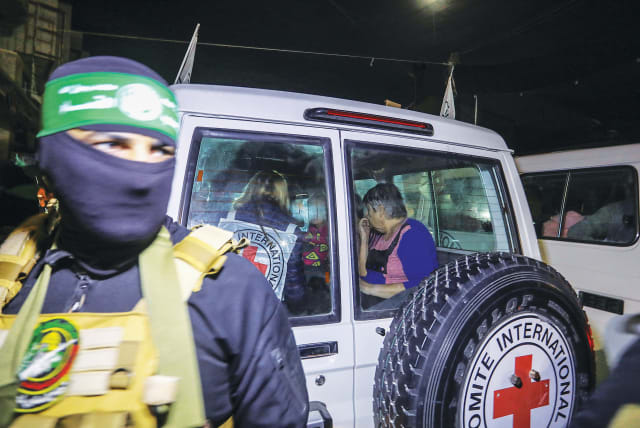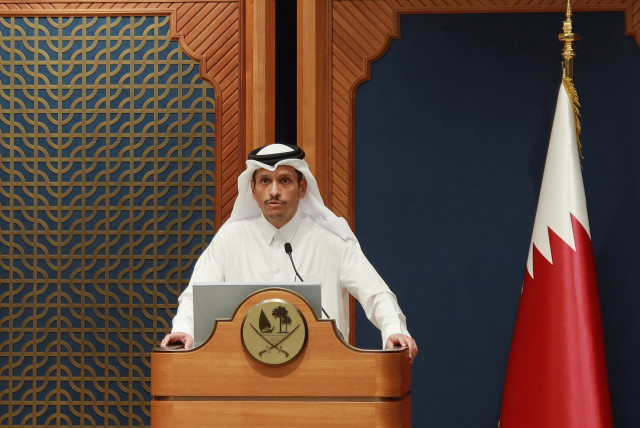Qatar: Extremist Israeli statements complicating hostage talks

On Monday Prime Minister Benjamin Netanyahu told the French Minister of the Armed Forces that Israel had not yet received any verification that the medications had reached the hostages.
Extremist Israeli statements, worsening humanitarian conditions, and the continued Israeli military campaign in Gaza are complicating mediation efforts for a hostage deal, Qatar Foreign Ministry spokesman Majed Al-Ansari told reporters on Tuesday.
“We are always hopeful but not necessarily optimistic,” he said, describing a situation of “round the clock” efforts. “The negotiations are still taking place. They have not stopped. Both sides are talking, and we are hopeful that will lead to something.”“We are engaging in serious discussion with both sides,” Ansari said. “We have presented ideas to both sides. We are getting a constant stream of replies from both sides. That in its own right is a cause for optimism.”“But the situation on the ground is very much fluid,” he stressed.
Ansari underscored, however, that “every day, you get information coming in that is harmful to the mediation process,” including the continuation of the war in Gaza itself.“Obviously, when one side [Israel] says they do not accept the two-state solution, that they would not stop this war,” or they discuss forcibly displacing Palestinians in Gaza, “that leads to a harder negotiation process.”“Also, the humanitarian situation is much worse,” he added, arguing that it is more difficult to get humanitarian assistance into Gaza than it was before.
Media leaks about hostages deals were false
He said that much of the information leaked to the media about potential deals was missing important elements and was simply false.Ansari spoke amid a flurry of media leaks about potential deals, all of which involve some basic elements, such as a pause in the war, freezing the hostages, and the release of Palestinian security prisoners from Israeli jails.According to CNN, one ceasefire agreement proposal included sending Hamas leaders into exile.Among the sticking points in the negotiating process have been Hamas’ demand that Israel end its military campaign in Gaza and Israel’s insistence that it would only allow for a pause in the fighting.In November, mediating countries Egypt and Qatar reached a deal according to which 105 captives of the 253 seized in the Hamas-led October 7 attack were freed in exchange for a week-long pause in the fighting. Five were freed separately, and the bodies of another 11 of the captives were returned to Israel.Relatives of the hostages have insisted that Israel must make a deal now to secure the release of the remaining 132, stressing that their lives are in danger every day that they remain in captivity.Government spokesman Eylon Levy said, “There will be no ceasefire that leaves hostages in Gaza and Hamas in power” in the enclave.It appears, he said, that 28 of the Gaza hostages have died or been killed in captivity, stressing that the hostages are being tortured and raped.“We call on all countries to pressure Hamas by all means possible to release the hostages immediately and unconditionally and secure access for the Red Cross until then,” he said.Concerning humanitarian aid, Levy said that 186,5490 tons of goods aboard 10,136 trucks have entered Gaza since the start of the war on October 7.“There is excess capacity for more aid to enter; there are no limitations on the admission of humanitarian aid. International actors interested in seeing more aid in Gaza should send more,” he said.UN agencies are unable to process the goods and are “covering up the fact that Hamas is hijacking aid” as well as their systemic failure, he noted.Earlier this month, France and Qatar reached a deal in which extra medication entered Gaza based on the understanding that some of the drugs would be given to the hostages, who have been without medication since they were seized on October 7.On Monday, Prime Minister Benjamin Netanyahu told the French minister of the Armed Forces, Sébastien Lecornu, that Israel had not yet received any verification that the medications had reached the hostages.Hamas has yet to allow the representatives of the International Committee of the Red Cross to visit the hostages.According to the French Embassy in Israel, Lecornu said that this transfer would be subject to verification to the best extent possible.
Jerusalem Post Store
`; document.getElementById("linkPremium").innerHTML = cont; var divWithLink = document.getElementById("premium-link"); if (divWithLink !== null && divWithLink !== 'undefined') { divWithLink.style.border = "solid 1px #cb0f3e"; divWithLink.style.textAlign = "center"; divWithLink.style.marginBottom = "15px"; divWithLink.style.marginTop = "15px"; divWithLink.style.width = "100%"; divWithLink.style.backgroundColor = "#122952"; divWithLink.style.color = "#ffffff"; divWithLink.style.lineHeight = "1.5"; } } (function (v, i) { });

